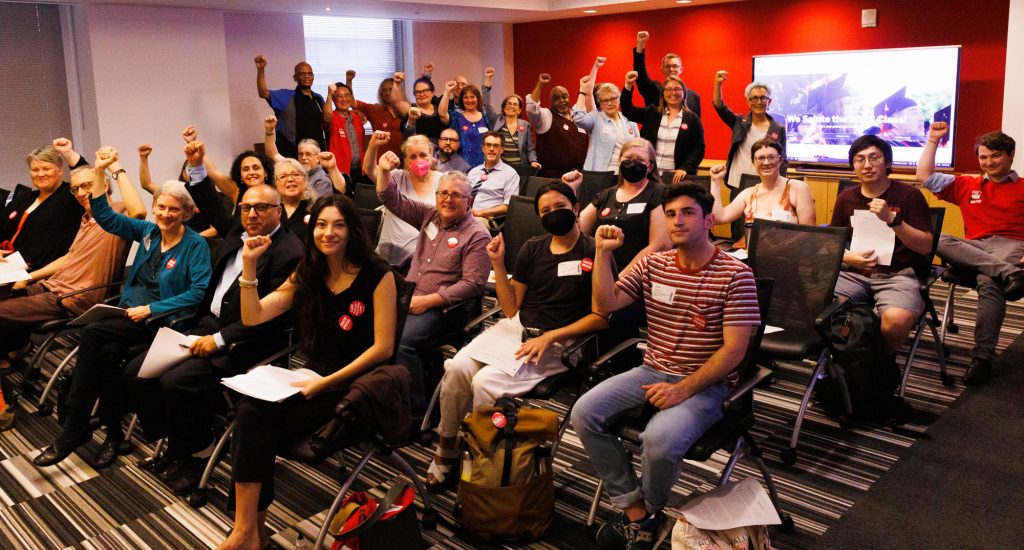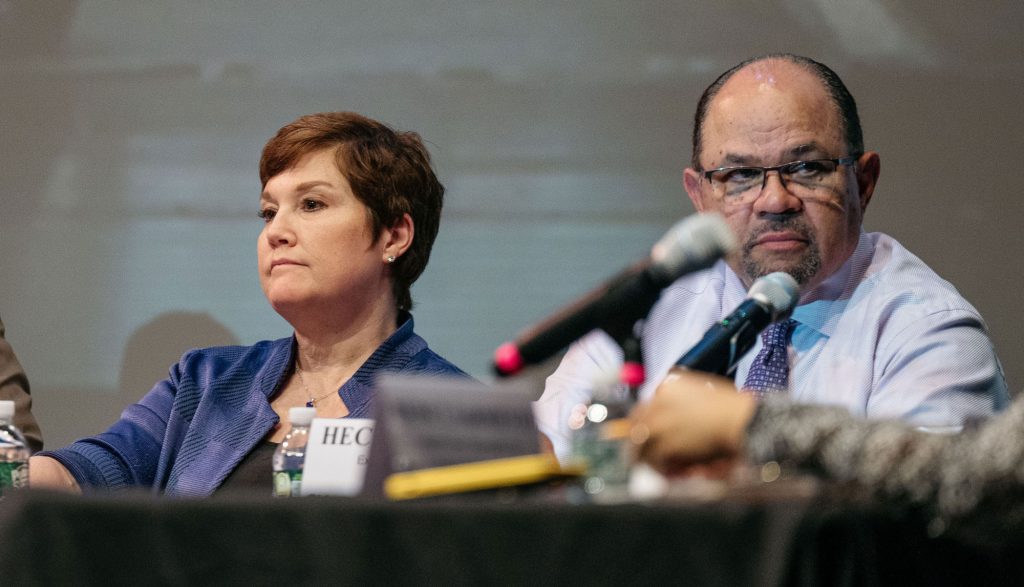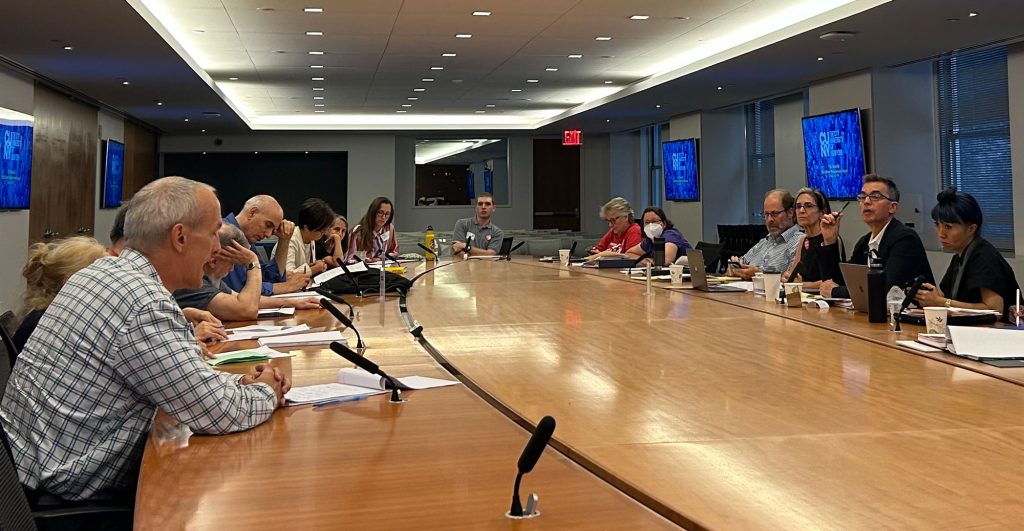
The PSC Bargaining Team (standing in the back) and member observers (seated) before a PSC-CUNY bargaining session at CUNY headquarters. (Credit: Paul Frangipane)
Flanked by members of the PSC Bargaining Team as he addressed PSC member observers gathered before the union’s fifth bargaining session with CUNY management in late August, PSC President James Davis didn’t mince words when he characterized management’s bargaining agenda.
“It’s a bad bargaining agenda,” Davis said, calling it a “kitchen sink” approach to labor relations. The management agenda, which the union had received in the previous bargaining session, includes a whole host of givebacks – excluding department chairs and various HEO titles from the bargaining unit, excluding elected union officials from serving in campus governance, limiting promotional opportunities and undermining job protections for HEOs, among other incursions.
BARGAINING AGENDA
But Davis, addressing members in a conference room in CUNY Central’s Midtown headquarters, remained confident that the union would not only fight back against these proposals, but also achieve many of the union’s ambitious demands. He pointed out that CUNY’s demands were completely out of step with the trends in other recently settled state labor contracts.
“We have seen very bad bargaining agendas before from CUNY,” Davis said, noting that many bad management proposals have been defeated at the bargaining table. “I’m confident we’re going to do that again,” he said.
Proposing to remove department chairs and professional staff who work in the budget office, controller’s office and other offices is an extremely harmful proposal, as it is not up to the employer whether someone in the bargaining unit can be a union member. Delimiting the titles that can join the union serves to suppress the union’s dues income and it also breaks solidarity among members on campus. Some members, seeing this demand in the context of a historic campaign by the Right to destroy labor unions, believe this demand to be anti-union.
Sharon Persinger, a university-wide officer on the PSC Executive Council who serves on the Bargaining Committee, said it was particularly egregious that management would seek to bar elected union representatives from serving in campus governance. Such a change amounted to management dictating to faculty who they were allowed to vote for.
The demand by management to allow campuses to refuse PSC members promotions based on budgetary constraints sends a “chilling message,” Davis said, as it tells members, “You can forget about being promoted.”

Will administrators like Wendy Hensel (left) and Héctor Batista keep to their word? (Credit: Scott Heins)
PSC First Vice President Andrea Vásquez noted in a lengthy statement to CUNY management that their agenda doesn’t reflect the positive attitude with which management opened the first bargaining session. She quoted Héctor Batista, CUNY’s executive vice chancellor and chief operating officer, saying, “Faculty and staff demonstrated exceptional flexibility, creativity and commitment.” And she quoted Wendy Hensel, CUNY’s executive vice chancellor and university provost, saying, “We recognize that the people who are sitting on that side of the table are the people who make up the heart and soul of this university.”
But, Vásquez noted, “What CUNY has put on paper does not at all reflect those sentiments.
“We all need fair raises that, yes, do take into account the role that inflation plays at this time,” she said. “That makes perfect sense to us. The raises the CUNY [Board of Trustees] granted CUNY administrators beat the rate of inflation by a landslide.”
She added, “Even with the good raises we expect, it will be difficult to get to where we should be in one contract. That is one reason we have always negotiated noneconomic demands. They recognize and reward members in ways that show respect, fairness and appreciation for the work we do.”
Hammering home the fact that CUNY faculty and staff need real raises, PSC research shows that CUNY faculty and staff are underpaid when compared to peer institutions in the tristate area. However, CUNY management disputes this claim.
LACK OF AFFORDABILITY
The PSC’s position is underscored by the findings of a recent CNBC article: Manhattan is the most expensive place to live in the United State, Brooklyn the fourth most expensive, Queens the 13th and Nassau County the 15th. Research shows that few PSC members can afford to live where they work.
The union is aggressively fighting against management’s proposals at the bargaining table, and seeks not only to keep the contract intact, but to enhance job security protections, benefits and pay for members.
Since contract bargaining began in early summer, the union has invited member observers to each bargaining session. These members have shown management that the Bargaining Committee (which is made up of the union’s principal officers and Executive Council members) is supported by the rank-and-file. It also serves to illustrate the labor axiom, “The boss is the best organizer.” When members see management’s disposition toward the union at the table, they are inspired to organize and express their unity. As Clarion went to press, union members were engaging in “union week” on their campuses and preparing for further actions throughout the five boroughs.
“It feels like they’re consistently refusing to see our concerns as valid,” said Forrest Riise Pelsue, a graduate assistant at the Graduate Center who observed the fifth session. “They’re very quick to dismiss any concerns that we raise.”
MEMBER SUPPORT

In a break from bargaining, the PSC Bargaining Team (right) discusses contract goals with member observers (left). (Credit: Ari Paul)
In addition to observers, rank-and-file members from across the University have offered testimony to management at the bargaining table in order to humanize many of the PSC’s demands.
Davis said having member observers in the room during bargaining builds union power as the contract campaign goes forward. He pointed out, for example, that there was a strength in the diversity of PSC’s observers, noting that at each session CUNY saw professional staff, full-time faculty, adjuncts, graduate workers and CLIP instructors among those assembled.
“We feel your support in the room,” Davis said.
Published: September 27, 2023

